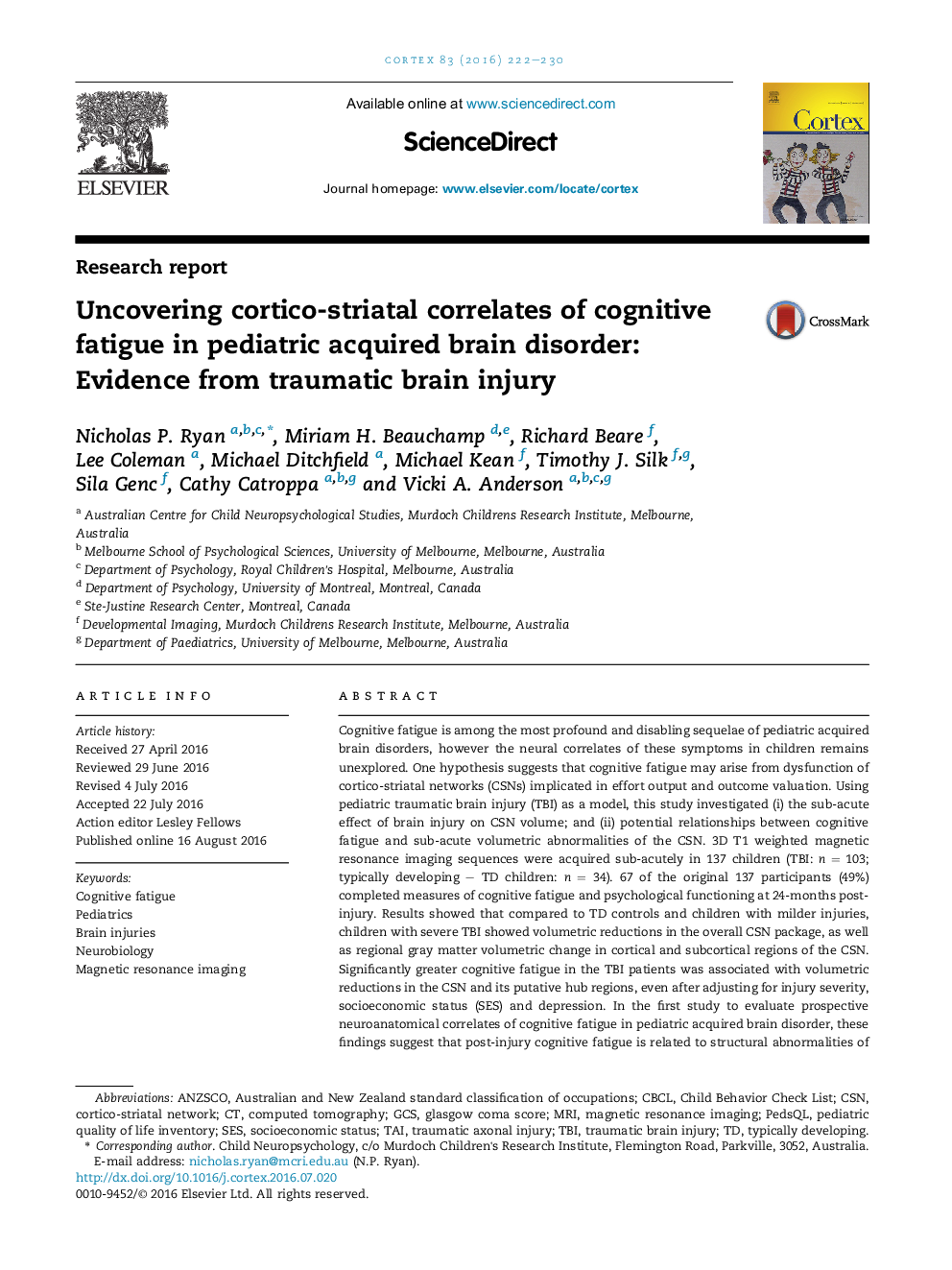| کد مقاله | کد نشریه | سال انتشار | مقاله انگلیسی | نسخه تمام متن |
|---|---|---|---|---|
| 7312587 | 1645029 | 2016 | 9 صفحه PDF | دانلود رایگان |
عنوان انگلیسی مقاله ISI
Uncovering cortico-striatal correlates of cognitive fatigue in pediatric acquired brain disorder: Evidence from traumatic brain injury
ترجمه فارسی عنوان
کشف همبستگی های کورتیکواستروییاتیک از خستگی شناختی در اختلال مغزی فرا گرفته شده در کودکان: شواهدی از آسیب مغزی آسیب دیده
دانلود مقاله + سفارش ترجمه
دانلود مقاله ISI انگلیسی
رایگان برای ایرانیان
کلمات کلیدی
TBICSNPedsQLGCsCBCLTAI - ORTraumatic axonal injury - آسیب آسیب تروماتیکTraumatic brain injury - آسیب تروماتیک مغزBrain injuries - آسیب مغزیSES - آنMRI - امآرآی یا تصویرسازی تشدید مغناطیسیtypically developing - به طور معمول در حال توسعه استMagnetic resonance imaging - تصویربرداری رزونانس مغناطیسیcomputed tomography - توموگرافی کامپیوتری یا سی تی اسکن یا مقطعنگاری رایانهایCognitive fatigue - خستگی شناختیGlasgow Coma Score - نمره Glasgow ComaNeurobiology - نوروبیولوژیsocioeconomic status - وضعیت اجتماعی و اقتصادیPediatric Quality of Life Inventory - پرسشنامه کیفیت زندگی کودکانPediatrics - پزشکی کودکان یا طب اطفال
موضوعات مرتبط
علوم زیستی و بیوفناوری
علم عصب شناسی
علوم اعصاب رفتاری
چکیده انگلیسی
Cognitive fatigue is among the most profound and disabling sequelae of pediatric acquired brain disorders, however the neural correlates of these symptoms in children remains unexplored. One hypothesis suggests that cognitive fatigue may arise from dysfunction of cortico-striatal networks (CSNs) implicated in effort output and outcome valuation. Using pediatric traumatic brain injury (TBI) as a model, this study investigated (i) the sub-acute effect of brain injury on CSN volume; and (ii) potential relationships between cognitive fatigue and sub-acute volumetric abnormalities of the CSN. 3D T1 weighted magnetic resonance imaging sequences were acquired sub-acutely in 137 children (TBI: n = 103; typically developing - TD children: n = 34). 67 of the original 137 participants (49%) completed measures of cognitive fatigue and psychological functioning at 24-months post-injury. Results showed that compared to TD controls and children with milder injuries, children with severe TBI showed volumetric reductions in the overall CSN package, as well as regional gray matter volumetric change in cortical and subcortical regions of the CSN. Significantly greater cognitive fatigue in the TBI patients was associated with volumetric reductions in the CSN and its putative hub regions, even after adjusting for injury severity, socioeconomic status (SES) and depression. In the first study to evaluate prospective neuroanatomical correlates of cognitive fatigue in pediatric acquired brain disorder, these findings suggest that post-injury cognitive fatigue is related to structural abnormalities of cortico-striatal brain networks implicated in effort output and outcome valuation. Morphometric magnetic resonance imaging (MRI) may have potential to unlock early prognostic markers that may assist to identify children at elevated risk for cognitive fatigue post-TBI.
ناشر
Database: Elsevier - ScienceDirect (ساینس دایرکت)
Journal: Cortex - Volume 83, October 2016, Pages 222-230
Journal: Cortex - Volume 83, October 2016, Pages 222-230
نویسندگان
Nicholas P. Ryan, Miriam H. Beauchamp, Richard Beare, Lee Coleman, Michael Ditchfield, Michael Kean, Timothy J. Silk, Sila Genc, Cathy Catroppa, Vicki A. Anderson,
